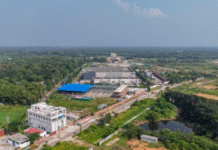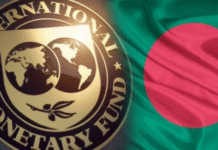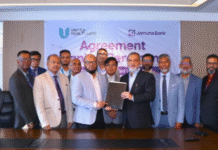The National Board of Revenue has shelved its plan to impose surcharge on different sectors to raise funds for implementing the much-vaunted Padma Multipurpose Bridge project.
‘We will not impose any surcharge on any sector for the construction of the bridge and no new or additional tax will be imposed on taxpayers for this purpose,’ NBR chairman Ghulam Hussain told reporters after a budget preparation meeting with finance minister Abul Maal Abdul Muhith on Wednesday at the revenue board headquarters.
He, however, said the NBR might make a special contribution in construction of the bridge by generating additional revenue from domestic sources.
But, he said, ‘We don’t want to impose any extra-burden in the name of surcharge on taxpayers.’
The NBR chief said the revenue board could provide around Tk 10,000 crore to Tk 12,000 crore for construction of the bridge by resolving disputes related to income tax, customs duty, and value-added tax with businesses using alternative dispute resolution mechanism in the next four years.
‘We can also contribute through preventing tax evasion and tax leakage due to anomalies in the tariff structure,’ he said, adding that importers evaded a huge amount of tax by misusing the current tariff structure.
Ghulam said commercial import as well as revenue would be boosted, if the revenue board could rationalise the existing tariff or import duty structure.
The government in June 2012 directed the revenue board to work out a plan to raise money for construction of the Padma Bridge after the World Bank suspended its $ 1.2 billion credit to the $ 2.9 billion project.
The NBR on the government instruction planned to impose surcharge on different goods and services, such as mobile calls, air tickets, land sales, and some luxury products, to raise funds for the project.
But the plan was shelved after the WB in September last agreed to revive the credit line.
However, at a government request the WB on January 31 finally withdrew its plan to finance the project.
Then in February, the revenue board revived its surcharge imposition plan.
Ghulam said, ‘Now we don’t see any need for imposing any surcharge for this purpose and the finance minister also instructed us to work in our line.’
The NBR since March 2012 to date has realised around Tk 60 crore using ADR mechanism as only few businesses have adopted this approach to dispute resolution, he said.
But the revenue board has established a cell to make ADR mechanism popular among the businessmen as settling a case in traditional courts involves huge time and cost.
ADR cell officials will identify the potential business people and pursue them to settle their disputes through ADR, Ghulam said, adding that the revenue board would also organise three seminars outside Dhaka to create awareness among the taxpayers about advantages of ADR mechanism.
The tax administration in March 2012 introduced ADR mechanism in recovering revenue of around Tk 26,500 crore in income tax, duties, and VAT stuck for long in the legal process.
The number of disputes over income tax, VAT, and customs duties pending with different courts is around 25,000, said NBR officials.
Ghulam said, ‘Although we could not realise a significant amount through ADR and possibly will not see any significant progress in this regard in the current fiscal year, from the next fiscal we are hopeful to get a tremendous response from the taxpayers to our campaign for ADR.’
NBR members Bashir Uddin Ahmed, Syed Aminul Karim, Firoz Shah Alam, Md Shahjahan, and Kalipada Halder were also present at the briefing.
Source: New Age









